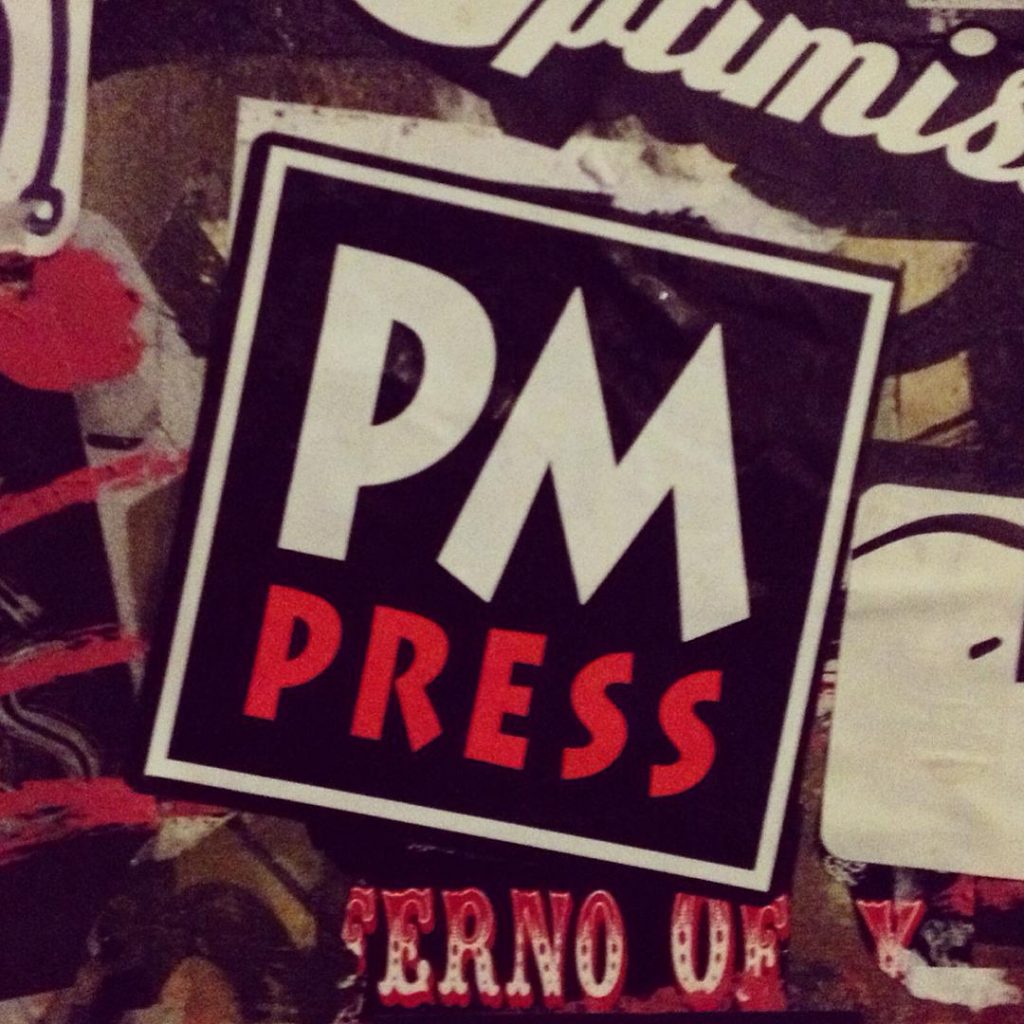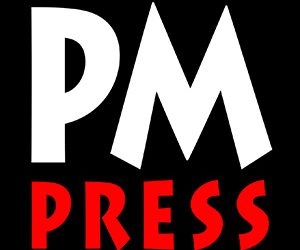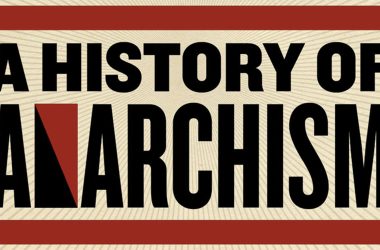
By Craig O’Hara
Fifth Estate
Summer 2018
“If a revolutionary’s first weapon is a book, PM Press has the arsenal. Their texts are battle plans for a new world.” —Peter Werbe, Fifth Estate
PM Press celebrated its tenth anniversary of publishing in May with a bang-up party in Oakland, Calif., where staff, authors, and various well-wishers howled at political sketch comedy, smashed a captured Amazon delivery drone, and danced the night away to good old punk rock.
PM Press was founded at the end of 2007 by a small collection of people with decades of publishing, media, and organizing experience. At the outset we strived to create and distribute radical audio, video, and text releases through every available channel in all possible formats. True to one expanded variation of our name, “Print Matters,” we’re shamelessly biased in favor of hardcopy books as the best format to communicate ideas for social change.
In many ways, book publishing is similar to entertainment-related industries like professional sports or music, where the pressure is heavy to produce recognized, celebrity-driven material aimed at the lowest common denominator, as quickly and cheaply as possible. Our peers in publishing too often chase the wild goose they hope will carry them into a financially secure situation. This includes not just authors but every part of the industry involved with publishing a physical book, most of whom have little active role in promoting social change: rural paper mills, industrial park printers, strained freight carriers, overstocked distributors, and brick and mortar stores.
“When the PM Press book cart rolls into town, it’s reassuring to know that the drivers have as much vision as the writers that they carry.” —Ian MacKaye, Dischord Records
PM Press has never had a New York Times bestseller, and you will not find our books reviewed in its pages. It’s not part of the financial equation for small presses to reach the mainstream by moving millions of copies of single titles—although we have sold millions of copies of books in total, often one at time, face to face. Events like anarchist book fairs and the existence of radical book shops are critical to exposing our work around the world. We organized, promoted, or attended 370 author events and 200 tabling exhibits in 2017 alone. PM is currently staffed by 10 people: several scattered around the West Coast, others working from the Rockies, Appalachia, New England, Montreal, and in the UK. After years of volunteer work, we are able to pay living wages by producing 30 books per year for gross sales surpassing a million dollars. And like Fifth Estate, PM just celebrated our 400th release.
There is a shrinking audience in 2018 for what we’d call historical anarchist texts, which have long been the staple of movement publishers. While anarchism has earned respect as a topic of intellectual study and debate in the universities, the discourse too often takes place apart from the poor and working-class communities that nurtured the movement in the 19th and 20th centuries; defanged by spring-break symposiums and backslapping sabbaticals.
One of our tasks as anarchist publishers, then, is to inject the historical politics of anarchism—active self-organizing, promotion of equality, opposition to hierarchy, the state, and organized religion—into the movements, milieus, and media of the times. Anarchism is always on the side of the oppressed. It never seeks mainstream respectability.
“Working with a press that respects writers and is committed to radical politics is a dream come true. It helps that they also make great and beautiful books. I find PM books all over the world; it’s a sign that I’ve found a great bookseller.” —Cory Doctorow, author of The Great Big Beautiful Tomorrow
The good news is that we have a broad enough umbrella to be a part of the discussion within many different cultures and experiences, from political prisoners to punk rockers, social scientists to cartoonists. Among our bestsellers, books such as Sisters of the Revolution: A Feminist Speculative Fiction Anthology,the full-color Understanding Jim Crow: Using Racist Memorabilia to Teach Tolerance and Promote Social Justice, and the West Virginia history book Gun Thugs, Rednecks, and Radicals, bridge perceived gaps between traditional supporters of anarchist publications, those involved with grassroots social justice activism, and professional writers and educators doing some of the best work in their fields.
At the tiny level on which independent publishers operate, selling 3,000 copies of a book in one year makes it a bestseller. A handful of anarchist-specific backlist titles, including books on the CNT in the Spanish Revolution, German philosopher Gustav Landauer’s collected works, and titles by UK activists Stuart Christie or Colin Ward, may not sell 100 copies annually, combined.
Many of the problems facing independent publishers today are the same as decades ago. Rising physical costs of producing a book—paper, freight, storage, advertising, distribution—are still everyday concerns. And who wants to do the unglamorous and physically demanding work of warehousing, or spend years learning the highly-detailed, solitary skills of proofing, indexing, and book design for projects that will rarely be financially profitable?
Yet countless writers, artists, and activists are submitting more manuscripts and proposals than PM could ever publish. If a dozen independent publishers formed tomorrow to disseminate these texts, in every format and genre, they’d have plenty of work to do, and we would all benefit.
“PM’s range is vast—coloring books and cookbooks, polemics, memoirs, novels, pamphlets, treatises, manifestos, and comics. PM’s topics are encyclopedic—bicycles, vegetables, squatting, sex, soccer, punks, Wobblies, self-defense, fathering, mothering, striking, sitting in, you name it. PM is an altogether terrific outfit keeping the flags flying—red, black, and rainbow.” —Peter Linebaugh, author of Stop, Thief!
Anti-authoritarian books garner plenty of attention within the modern anarchist movement, but building lasting alternatives to capitalism is what we have to do, not just churn out books. The ideas and examples contained in these books must inspire the doers who create community lending libraries, food-growing and sharing co-ops, non-capitalist child and elder care, prisoner support networks—and yes, as dated as it sounds, revolution against oppression by any means necessary.
Craig O’Hara, cofounder of PM Press and the Tabling Tornadoes, has spent the last twenty-five years publishing and selling radical books to stores big and small, at book fairs, academic conferences, rock concerts, flea markets, and activist gatherings nationwide.




